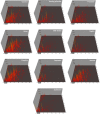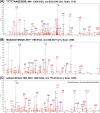Identification of species-specific peptide markers in cold-pressed oils
- PMID: 33203972
- PMCID: PMC7672054
- DOI: 10.1038/s41598-020-76944-z
Identification of species-specific peptide markers in cold-pressed oils
Abstract
In recent years, cold-pressed vegetable oils have become very popular on the global market. Therefore, new versatile methods with high sensitivity and specificity are needed to find and combat fraudulent practices. The objective of this study was to identify oilseed species-specific peptide markers, using proteomic techniques, for authentication of 10 cold-pressed oils. In total, over 380 proteins and 1050 peptides were detected in the samples. Among those peptides, 92 were found to be species-specific and unique to coconut, evening primrose, flax, hemp, milk thistle, nigella, pumpkin, rapeseed, sesame, and sunflower oilseed species. Most of the specific peptides were released from major seed storage proteins (11 globulins, 2S albumins), and oleosins. Additionally, the presence of allergenic proteins in the cold-pressed oils, including pumpkin Cuc ma 5, sunflower Hel a 3, and six sesame allergens (Ses i 1, Ses i 2, Ses i 3, Ses i 4, Ses i 6, and Ses i 7) was confirmed in this study. This study provides novel information on specific peptides that will help to monitor and verify the declared composition of cold-pressed oil as well as the presence of food allergens. This study can be useful in the era of widely used unlawful practices.
Conflict of interest statement
The authors declare no competing interests.
Figures





References
-
- Roy, A. & Deshmukh, R. Cold-pressed oil market: Global opportunity analysis and industry forecast. 2019–2026. Allied Market Research.https://www.alliedmarketresearch.com/cold-pressed-oil-market (2019).
-
- Hidalgo FJ, Zamora R. Peptides and proteins in edible oils: stability, allergenicity, and new processing trends. Trends Food Sci. Technol. 2006;17:56–63. doi: 10.1016/j.tifs.2005.10.006. - DOI
Publication types
MeSH terms
Substances
LinkOut - more resources
Full Text Sources

